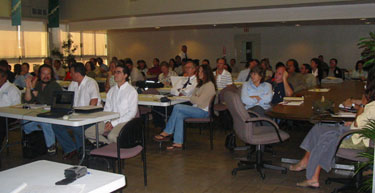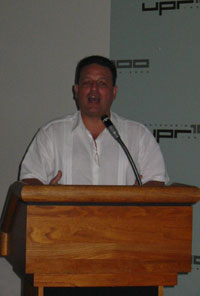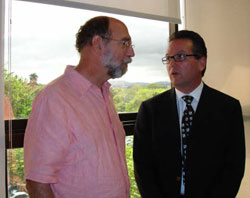You are here: Home › Ecosystems › Coral Reefs › Feature Stories › Scientists and Managers Meet to Review Scientific Research and Management Applications for Coral Reef Ecosystems in Puerto Rico
Scientists and Managers Meet to Review Scientific Research and Management Applications for Coral Reef Ecosystems in Puerto Rico

On February 17, 2006, scientists from throughout Puerto Rico and from the United States met on the grounds of the Botanical Gardens in San Juan, Puerto Rico to discuss the latest research on Puerto Rico 's coral reef ecosystems. Coral reefs around the island are threatened by a variety of stressors, including smothering by sediments, nutrient enrichment and algal overgrowth, over-fishing, and disease. In particular, Dr. Edwin Hernandez reported on his surveys of reefs around Puerto Rico which revealed a high incidence of coral bleaching, attributed to the unusually high water temperatures this past summer. A substantial finding, as over 80% of the colonies bleached in half the locations surveyed. Nevertheless, Dr. Hernandez was able to identify conditions that offered significant protection from this syndrome, thus offering the possibility of setting up havens to protect coral diversity.


The CCRI is a cooperative program between the National Oceanic and Atmospheric Administration and the University of Puerto Rico at Mayagüez. The CCRI is administered by the Center for Sponsored Coastal Ocean Research , and is a core component of NOAA's Coral Reef Conservation Program. Its mission is to sponsor research to address management needs and to incorporate research results into management practice. For more information on CCRI, please visit the CCRI program web site or contact Michael.Dowgiallo@noaa.gov

